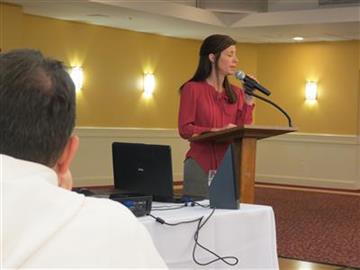On Tuesday, May 5th the Archdiocese of Philadelphia sponsored a workshop entitled Marriage-Centered Communities: How to Build a Marriage Ministry in Your Parish. This addressed the current state of marriage in the world and the Church and offered  practical ways that a parish can most effectively serve married couples. The first part of the workshop was led by Dr. Hilary Towers, a Catholic author and developmental psychologist from the Diocese of Arlington, Virginia.
practical ways that a parish can most effectively serve married couples. The first part of the workshop was led by Dr. Hilary Towers, a Catholic author and developmental psychologist from the Diocese of Arlington, Virginia.
Dr. Towers’ presentation posed the question: “What heritage are we leaving to the next generation?” Much of her talk provided statistical data on the state of Marriage in our country. Today the divorce rate is 51% which is an all-time high. Surprisingly, new data shows that more Americans are getting divorced after many years of marriage. The percentage of divorces filed by those 50 to 60 years old is skyrocketing.

There are various reasons given for divorce today, but some are more common than others. The most prevalent is that the couple has “grown apart”. A high percentage also claim that they separated because of an inability to “talk together”. Other common reasons given for divorce are “money problems” and “infidelity”.
It is clear from the data that marriage as an institution in the United States is fading. At one time marriage was a part of the fabric of American society. It was expected that most young people would enter into this bond of matrimony in their 20’s and it would continue for a lifetime. Fidelity was taken for granted. Divorce and/or separation would occasionally happen, but it was a rare occurrence in society as a whole.

To be sure, there have and always will be legitimate reasons for separation, but in general the goods of a stable bond far out way the contrary. Studies continually show that a stable home with a mother and father provides that best environment for raising children. Married couples can model so many virtues for their children. The couples teach by their example the good habits of charity, forgiveness, accountability, and commitment. Even in less than ideal situations, children are often given models of how to cope with weakness and sin in an imperfect world.
America and other developed nations are entering into a new reality of a society without marriage. In Judeo-Christian thought, the family has always been understood as the basic unit of civilization.As St John Paul II states, “Human fatherhood and motherhood … contain in an essential and unique way a’ likeness’ to God which is the basis of the family as a community of human life, as a community of persons united in love (Letter to Families, 6)”. Husband, wife, and children show forth the Trinity in a totally unique way. This family is the ideal place for raising children to be responsible citizens
What if our next generation does not have the stability of the traditional family? We are beginning to see that millennials have a much less confidence in the possibility of commitments. Today about 20% of adults 18-29 years old have decided to cohabitate and/or not even consider marriage. There is in general a lack of trust in others and in the institution of marriage. On a purely economic level, the increase of divorce places more children in danger of poverty. It also puts a greater strain on government and state agencies to provide for many single parent homes.
Although things do not look so good for marriage today, there is much that can be done to help couples. As Dr. Towers says, “It is the Church working through the clergy and laity that will rehabilitate marriage.” Much can be done at the local level. The parish can and must build supportive communities of strong marriages. These married couples will become mentors of commitment for those who have none. The parish family also must pray for marriages at Mass and through various prayer groups. The laity need to encourage their pastors to preach about the Church’s treasury of wisdom on the Sacrament of Marriage. Parishes need to make accessible the practical components of a strong healthy marriage.
Things are not looking great today for the institution of marriage. The statistics show that fidelity and commitments to marriage are at all time lows. Yet, this basic unit of civilization is of inestimable value to society as a whole. For the sake of future generations, the each member of the Church must do their part support this Sacrament. Our gift to the next generation must be this: a renewed commitment to the Sacrament of Marriage.
More from Dr Hilary Towers:
It is time for the Church to face up to the crisis of spousal abandonment
xbzn3f
zptqdh
adtmo8
nhmkdc
fu9mih